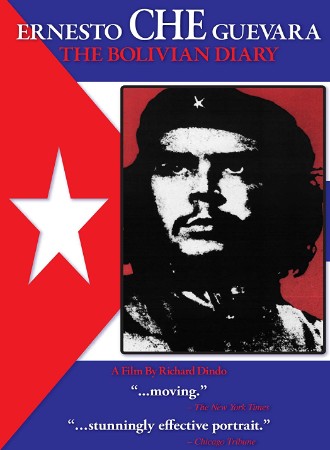
Ernesto Che Guevara: The Bolivian Diary 1994
Distributed by International Film Circuit Inc., P.O. Box 1151, Old Chelsea Station, New York NY 10011; 212-691-0770
Produced by Richard Dindo
A film by Richard Dindo
VHS, color, 94 min.
College - Adult
History, Latin American Studies
Date Entered: 11/09/2018
Reviewed by Terrence McCormack, Head, M. Robert Koren Center for Clinical Legal Education, Law Library, State University of New York at BuffaloErnesto Che Guevara, one of Fidel Castro's top lieutenants during the 1956 Cuban Revolution, and a proponent of exporting the Cuban Revolution around the globe, was executed by the Bolivian Army in October 1967. Before the start of his Fall 1966 Bolivian operation, Guevara served as the Cuban Minister of Industry. During that time Guevara's outspoken views on creating the ideal socialist state, a new socialist man and exporting the socialist revolution, earned him a reputation as an uncompromising ideologue.
The documentary portrays Guevara as evenhanded in his condemnation of US abuses in Latin America and Soviet excesses in other parts of the world. To Guevara, Soviet participation in peaceful coexistence with the United States, was tantamount to dividing the spoils of the third world between the superpowers. Soviet reaction to Guevara's criticism forced him to resign his government post in March of 1965. He remained true to his ideals by taking up arms in the Belgian Congo, and returning only once to Cuba for a brief training period. In November of 1966 he again sets out from Cuba, this time for Bolivia to participate in that country's struggle.
With the direction of Guevara's diary, Director Richard Dindo guides viewers through the mountainous Bolivian countryside and rough terrain in which Guevara's Army operated. Dindo's interlacement of Guevara's narrated entries, with archive photographs, and contemporary film footage provides viewers with Guevara's insights on the war and his situation. Through his dairy Guevara offer his personal views on politics, his struggle with asthma, his frustration with the lack of peasant support, and the deadly results of their guerrilla actions. Guevara as the story teller removes any abstract notion of a romanticized clandestine adventure, instead he offers only the harsh reality of war. Dindo complements Guevara's chronicle of events by presenting varied accounts of the war from Bolivians, Guevara's comrades and former members of the Bolivian Army.
The historic photographs are of marginal quality, and several English subtitles are difficult to read. However, the overall technical and visual quality of the work is above average. The program is recommended for use in academic courses dealing with the twentieth-century history of Cuba, Latin America, and insurgence movements.